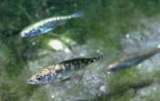
Speciation
Overview
Speciation is the evolution
ary process by which new biological species
arise. The biologist Orator F. Cook
seems to have been the first to coin the term 'speciation' for the splitting of lineages or 'cladogenesis
,' as opposed to 'anagenesis
' or 'phyletic evolution' occurring within lineages. Whether genetic drift
is a minor or major contributor to speciation is the subject matter of much ongoing discussion.
There are four geographic modes of speciation in nature, based on the extent to which speciating populations are geographically isolated from one another: allopatric
, peripatric
, parapatric
, and sympatric
.
Evolution
Evolution is any change across successive generations in the heritable characteristics of biological populations. Evolutionary processes give rise to diversity at every level of biological organisation, including species, individual organisms and molecules such as DNA and proteins.Life on Earth...
ary process by which new biological species
Species
In biology, a species is one of the basic units of biological classification and a taxonomic rank. A species is often defined as a group of organisms capable of interbreeding and producing fertile offspring. While in many cases this definition is adequate, more precise or differing measures are...
arise. The biologist Orator F. Cook
Orator F. Cook
Orator Fuller Cook was an American botanist, entomologist, and agronomist. Cook, born in Clyde, New York in 1867, graduated from Syracuse University in 1890. He worked for one year as an instructor at Syracuse. In 1891 Cook became a special agent of the New York State Colonization Society. He...
seems to have been the first to coin the term 'speciation' for the splitting of lineages or 'cladogenesis
Cladogenesis
Cladogenesis is an evolutionary splitting event in a species in which each branch and its smaller branches forms a "clade", an evolutionary mechanism and a process of adaptive evolution that leads to the development of a greater variety of sister species...
,' as opposed to 'anagenesis
Anagenesis
Anagenesis, also known as "phyletic change," is the evolution of species involving an entire population rather than a branching event, as in cladogenesis. When enough mutations have occurred and become stable in a population so that it is significantly differentiated from an ancestral population,...
' or 'phyletic evolution' occurring within lineages. Whether genetic drift
Genetic drift
Genetic drift or allelic drift is the change in the frequency of a gene variant in a population due to random sampling.The alleles in the offspring are a sample of those in the parents, and chance has a role in determining whether a given individual survives and reproduces...
is a minor or major contributor to speciation is the subject matter of much ongoing discussion.
There are four geographic modes of speciation in nature, based on the extent to which speciating populations are geographically isolated from one another: allopatric
Allopatric speciation
Allopatric speciation or geographic speciation is speciation that occurs when biological populations of the same species become isolated due to geographical changes such as mountain building or social changes such as emigration...
, peripatric
Peripatric speciation
Peripatric and peripatry are terms from biogeography, referring to organisms whose ranges are closely adjacent but do not overlap, being separated where these organisms do not occur – for example a wide river or a mountain range. Such organisms are usually closely related Peripatric and...
, parapatric
Parapatric speciation
Parapatry is a term from biogeography, referring to organisms whose ranges do not significantly overlap but are immediately adjacent to each other; they only occur together in the narrow contact zone, if at all. This geographical distribution is opposed to sympatry & allopatry or peripatry...
, and sympatric
Sympatric speciation
Sympatric speciation is the process through which new species evolve from a single ancestral species while inhabiting the same geographic region. In evolutionary biology and biogeography, sympatric and sympatry are terms referring to organisms whose ranges overlap or are even identical, so that...
.

